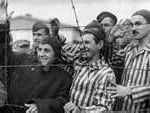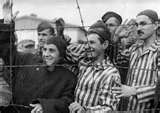
Those who sang Hatikva at Bergen-Belsen did not become a people because they lived together, or spoke the same language or even looked alike. They were a people that became a nation because G-d ordained it to be so.
On April 15, 1945, British forces liberated the Bergen-Belsen concentration camp in northern Germany. Sixty-thousand prisoners were living in the camp when the troops arrived, most of them seriously ill. Thousands more lay dead and unburied on the camp grounds. Five days after the liberation, the sick and starving survivors gathered for their first Shabbat service since the fires of destruction began.
The Jewish chaplain to the British second army, Rav L. H. Hartman, led the service. Recording it for posterity was BBC reporter Patrick Gordon Walker. Knowing they were being recorded, it seemed those survivors wanted to send a message to the world. They gathered what little strength they had and sang an earlier version of what was to become Israel’s national anthem, Hatikva, The Hope.
To Listen to a recording of that moment go to
The passion mixed with pain in their voices made the words resonate in such a deep and powerful way. It was clear that such a passion could never be extinguished. What then gives strength to a people who had witnessed the greatest evil, felt it burnt into their own flesh, and yet still believed there was hope?
The secret may lie in the fact that they were a people that did not become a people because they lived together, or spoke the same language or even looked alike. They were a people that became a nation because G-d ordained it to be so. They came out of Egyptian slavery and after trials and tribulations received their mandate and their land. So it would be after their exodus from the valley of the shadow of death. Comprehending the presence of the Divine in the fires of Europe remains a mystery, but not so with their miraculous return and rebirth within their ancient land.
Israel’s independence was achieved by the sacrifices of so many who possessed that passion. It is a fire that burned in the hearts of the pioneers who dried the swamps and the underground who risked their lives against the British forces who had closed the gateways into the land. It still burns in the hearts of the young people volunteering for the elite units in the army and in those who build outpost after outpost in the hills of Judea and Samaria.
Yet clearly these successes can be confused as being simply the achievements of men and women with great courage and tenacity. Removing such ideas was also part of the cleansing that was needed after the exodus form Egypt. Every day of the counting of the omer, the simple barley sacrifice, helped keep their pride in check and brought them steadily forward on their national and personal spiritual journey.
In the midst of this counting of the omer we find the month of “ Iyar “ . Rabbi Avraham Yitzchak Kook wrote years before the declaration of the State of Israel regarding the month of Iyar; “ The Month of Iyar, a month described in the ancient books as a month that absorbs the delicate structure of Israelite independence ( the national entity born out of Egypt on Passover) together with the higher sensitivity of the spiritual light of torah ( received at Mount Sinai on Shavuot) .
What was in the past , will be again. The month of Iyar will again prepare the people for the spiritual revelation yet to come. Yom Ha-atzmaut ( Israel Independence day) and Yom Yerushalayim ( Jerusalem day) both ensconced in the month of Iyar are the building blocks of such a revelation.
Yet we are still only in the midst of such a process. As a result there are still many Jews that see the Day of Independence as being simply a celebration of human victory. It is fascinating that this view is shared both by the segments of our people that call themselves secular and those that call themselves Haredi. They both see Yom Haatzmaut as a day celebrating human prowess. That is the reason one side celebrates it while the other reject it.
Yet the time is fast approaching wherein they will realize that it is and always has been a day that celebrates G-d’s hidden and revealed miracles . Miracles that celebrate G-d’s fulfillment of the prophecies of Ezekiel (chapter 37) by bringing out the skeletons from the ovens of Auscwitz and giving them sinews , flesh and ruach. It is then that they will know what those people in Bergen Belsen sensed. It is then that they will declare and sing together on this great day ;
” Lo Bechayil velo bekoach , ki eem beruchi, not by might , nor by strength but by My Spirit says HaShem Tzvakot” . Moadim Lesimcha.
